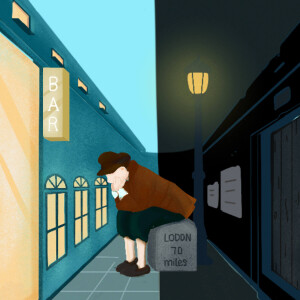
Monday Aug 21, 2023
Oliver Twist: A Tale of Resilience and Redemption
Chapter 1:the Oliver Twist Review
"Oliver Twist" by Charles Dickens is a classic novel that tells the story of an orphan boy named Oliver who navigates through the harsh realities of 19th-century London. The book offers a scathing critique of social injustices, particularly the mistreatment of children and the poor during that era.
The novel begins with Oliver's birth in a workhouse and follows his journey as he endures various hardships, such as abuse at the hands of his caretakers and exploitation by criminals. Through Oliver's encounters with characters like Fagin, the Artful Dodger, and Nancy, Dickens exposes the moral corruption and hypocrisy of society.
One of the notable strengths of "Oliver Twist" lies in Dickens' vivid portrayal of the settings and characters. His masterful storytelling brings Victorian London to life, depicting the stark contrasts between the affluent and the destitute. Additionally, Dickens' use of humor and satire adds depth and richness to the narrative.
The book explores themes of poverty, crime, social class, and the power dynamics that shape society. It sheds light on the struggles faced by those trapped in a cycle of poverty and the systemic issues that perpetuate their suffering. At its core, "Oliver Twist" is a plea for compassion, empathy, and social reform.
However, some critics argue that the novel lacks subtlety in its characterization and moralizing, presenting characters as either purely good or entirely evil. Others find fault in the melodramatic plot twists and coincidences that drive the story.
Nevertheless, "Oliver Twist" remains a significant work in English literature, highlighting Dickens' social consciousness and his commitment to exposing societal inequalities. It continues to resonate with readers for its powerful themes, memorable characters, and the enduring message of hope and resilience in the face of adversity.
Chapter 2:Characters in Oliver Twist
-
Oliver Twist: The protagonist and titular character, Oliver is an orphan who endures mistreatment and hardship throughout his journey. He is depicted as kind-hearted and morally upright, always striving to do what is right even in the face of adversity.
-
Fagin: A cunning and manipulative criminal, Fagin serves as the leader of a gang of child pickpockets. He takes advantage of young orphans like Oliver, training them in thievery and exploiting their vulnerability.
-
Nancy: A complex character, Nancy is a member of Fagin's gang who forms a bond with Oliver. Despite her involvement in criminal activities, Nancy possesses a compassionate nature and struggles with conflicting loyalties.
-
The Artful Dodger: A charismatic and skilled pickpocket, the Artful Dodger is one of Fagin's prominent apprentices. He introduces Oliver to the world of thievery and becomes a friendly companion to him.
-
Mr. Bumble: A pompous and self-important figure, Mr. Bumble is the parish beadle responsible for overseeing the workhouse where Oliver is initially raised. He epitomizes the callousness and indifference of those in authority.
-
Bill Sikes: A violent and ruthless criminal, Bill Sikes is Nancy's abusive boyfriend. He embodies the darkest aspects of society, committing heinous acts without remorse.
-
Mr. Brownlow: A kind-hearted gentleman, Mr. Brownlow shows compassion towards Oliver when he encounters the boy in London. He becomes a crucial figure in Oliver's life, offering guidance and protection.
-
Rose Maylie: A virtuous and compassionate young woman, Rose plays a significant role in Oliver's life, uncovering secrets about his past and aiding in his pursuit of happiness.
Chapter 3:Oliver Twist Themes
"Oliver Twist" by Charles Dickens explores various themes that shed light on the social and moral issues prevalent during 19th-century Victorian England. Here are some key themes from the novel:
-
Poverty and Social Injustice: One of the central themes in "Oliver Twist" is the depiction of the harsh realities faced by the poor and marginalized members of society. Dickens highlights the stark inequalities, institutional mistreatment, and lack of empathy towards those living in poverty.
-
Morality and Virtue: The novel delves into questions of morality and virtue, showcasing how characters like Oliver remain inherently good despite their challenging circumstances. Dickens emphasizes the importance of compassion, kindness, and ethical behavior in a world tainted by corruption.
-
Criminality and Redemption: Through characters like Fagin and his gang of child thieves, Dickens examines the influence of criminal environments and the potential for redemption. He explores the notion that individuals, even those who have been drawn into a life of crime, can still find salvation and transformation.
-
Identity and Social Class: The idea of identity and its connection to social class is explored in "Oliver Twist." Oliver's struggle to understand his true origins and navigate through different social strata highlights the influence of birth and societal structures on an individual's fate.
-
Hypocrisy and Deception: Dickens exposes the hypocrisy and deceit prevalent in society, particularly among those in positions of authority or respectability. Characters such as Mr. Bumble and the upper-class elites showcase the contradictions between public appearances and private actions.
-
Corruption and Exploitation: The novel uncovers the pervasive corruption and exploitation that permeates various institutions, including workhouses, orphanages, and the criminal underworld. Dickens criticizes the systems that perpetuate these abuses of power.
-
Love and Loyalty: Amidst the darkness, love and loyalty emerge as themes in "Oliver Twist." Characters like Nancy and Rose Maylie demonstrate unwavering loyalty and sacrifice, highlighting the power of genuine affection and its transformative potential.
No comments yet. Be the first to say something!